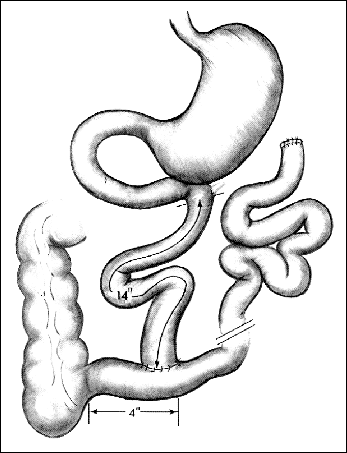Obesity:
- Complications of obesity
- Medical treatment
- Surgery for obesity
- Outcomes of surgery
- Complications of surgery
- NICE guidelines
- Life after surgery
Laparoscopic surgery for obesity:

Malabsorptive - The malabsorptive operations serve to reduce the capacity of the body to digest the constituents of the meal eaten by the person to maintain their current body weight.
These procedures are not generally performed today as they are associated with significant side-effects:
Jejuno-ileal Bypass- A reconfiguration of the small bowel is fashioned to transmit undigested food to the lower region of the terminal ileum. This has the effect of eliminating the majority of the small bowel from the digestive process. The weight loss is dramatic, but so are the side effects on bowel function and vitamin and mineral metabolism. It is reversible if required.
These complications included: diarrhoea, night blindness (from vitamin A deficiency), osteoporosis (from vitamin D deficiency), protein-calorie malnutrition, and kidney stones. Some of the most worrisome complications were associated with the toxic overgrowth of bacteria in the bypassed intestine. These bacteria then caused liver failure, severe arthritis, skin problems, and flu-like symptoms.
The theory behind the success of this procedure is the restriction it places upon the person to absorb food at each meal. It has little effect on the person's sense of hunger and forces them to adapt their eating habits to avoid the unpleasant sensations associated with eating more than a few mouthfuls at a time. These effects include diarrhoea, dizzyness and nausea, especially if food and liquids are combined in the same meal.